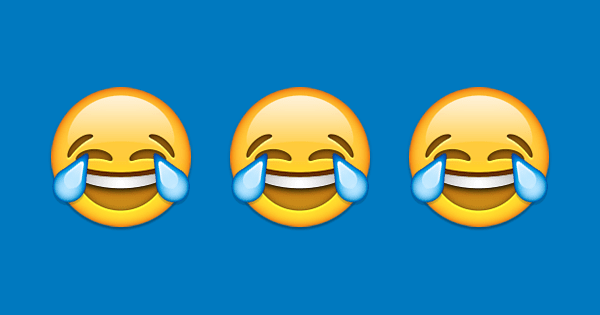The Clarity team weigh in with three views on the announcement:
Mikela Dennison, Account Manager, The Clarity Business
Emojis take their rightful place in the lexicon of 2015
So, Oxford Dictionary has announced the 'face with tears of joy' emoji as the Word of the Year for 2015. People are up in arms - including my two colleagues - that an emoticon could be a stand in for the written English language.
I have to respectfully disagree.
I was one of millions of people who were beyond delighted when the taco and unicorn emojis were introduced to the alternative keyboard a few months ago, along with a number of other equally awesome characters. My friends and I - none of whom are silly 15 year old school girls, the last time I checked - litter our Facebook Messenger group conversations with emojis that make perfect sense to everyone, in context.
Although, I have to say the tears of joy emoji is in fact my third most commonly used emoji, with the pink love heart and the awkward face taking the first two spots. Please, don't judge me.
 Of course, as a professional writer and communications specialist, with a Master's degree in Communication Studies, language is the foundation of my life, day in, day out, so please don't take this to mean I'm a fan of eroding the English language - far from it.
Of course, as a professional writer and communications specialist, with a Master's degree in Communication Studies, language is the foundation of my life, day in, day out, so please don't take this to mean I'm a fan of eroding the English language - far from it.
I think that emojis take communication to a whole new level: how fascinating is it that you can ask someone to go for a coffee and a chat, or a wine and a boogie, without a single written word being spoken? To show empathy or disagreement, or delight, through a single, well-placed and timely emoticon? I'd take the tears of joy emoji to express my enjoyment at something hilarious over a 'ROTFL' or 'LMAO' any day of the week.
I see our favourite 140 character micro-blog service Twitter is also now thinking about introducing emojis as a way of responding to tweets, to bolster the recently updated 'like' symbol (a heart). I must say, I think it's a sign of the times. Here's why:
How can that be a bad thing?
Dylan Brown, Communications Executive, The Clarity Business
Is the English language dying? Probably
With Oxford Dictionary announcing the "tears of joy" emoji as 2015's Word of the Year on the same day Caitlyn Jenner was awarded Glamour Magazine's Woman of the Year, it seems to me that award-givers are more focused on attracting controversy these days than anything else.
Now, firstly I must counter my colleague Mikela's claim that I am against the emoticon, although I understand her reasoning, as I did roll my eyes and scoff loudly in retaliation to hearing the news.
I too enjoy using the odd emoticon or two, although I only tend to use them in conversations when I'm unsure how to respond, as featured in the image below:

Caption: A typical conversation between Dylan and himself.
What I am against, however, is the fact that Oxford is not playing by the rules. There are plenty of cool, hip words they could have chosen instead. In fact, it feels like an act of microaggression - a statement, action, or incident regarded as an instance of indirect, subtle, or unintentional discrimination against members of a marginalized group, and also, coincidentally, a word that was recently added to the Oxford Dictionary that would have made a perfect Word of the Year.

So no, I don't believe the emoji deserves its position as Word of the Year. Then, right before I feel another wave of complicated life questions heading my way, such as Is this the future of the English language? What is becoming of humanity? Why does everyone hate House Snow? When does the next episode of Suits come out? And Why did all the dinosaurs have to die?, I remind myself that the last few winners of Oxford Dictionary's Word of the Year haven't exactly been of a high standard.
Need I remind you all of last year's word – Vape – the act of inhaling vapour from an e-cigarette, 2013's Selfie– taking a photo of yourself, and 2012's Omnishambles, a poorly organised situation. I guess one could say that it has never been more evident that Shakespeare died a long, long time ago.
To conclude, while I appreciate the emoticon, it seems that Oxford Dictionary's Word of the Year is about as pointless as Let Me Google That For You, a site that Googles things for you.
George Hulbert, Director, The Clarity Business
In 140 characters or less
It's so depressing. Emojis are for people who can't use actual words. Sad face, tears. #UseWords #GoEnglish
What do you think? Is this a sign of the times, or the beginning of the end for the English language?
Mikela Dennison, Account Manager, The Clarity Business
Emojis take their rightful place in the lexicon of 2015
So, Oxford Dictionary has announced the 'face with tears of joy' emoji as the Word of the Year for 2015. People are up in arms - including my two colleagues - that an emoticon could be a stand in for the written English language.
I have to respectfully disagree.
I was one of millions of people who were beyond delighted when the taco and unicorn emojis were introduced to the alternative keyboard a few months ago, along with a number of other equally awesome characters. My friends and I - none of whom are silly 15 year old school girls, the last time I checked - litter our Facebook Messenger group conversations with emojis that make perfect sense to everyone, in context.
Although, I have to say the tears of joy emoji is in fact my third most commonly used emoji, with the pink love heart and the awkward face taking the first two spots. Please, don't judge me.
 Of course, as a professional writer and communications specialist, with a Master's degree in Communication Studies, language is the foundation of my life, day in, day out, so please don't take this to mean I'm a fan of eroding the English language - far from it.
Of course, as a professional writer and communications specialist, with a Master's degree in Communication Studies, language is the foundation of my life, day in, day out, so please don't take this to mean I'm a fan of eroding the English language - far from it.I think that emojis take communication to a whole new level: how fascinating is it that you can ask someone to go for a coffee and a chat, or a wine and a boogie, without a single written word being spoken? To show empathy or disagreement, or delight, through a single, well-placed and timely emoticon? I'd take the tears of joy emoji to express my enjoyment at something hilarious over a 'ROTFL' or 'LMAO' any day of the week.
I see our favourite 140 character micro-blog service Twitter is also now thinking about introducing emojis as a way of responding to tweets, to bolster the recently updated 'like' symbol (a heart). I must say, I think it's a sign of the times. Here's why:
- We're more visual than ever before. We consume an astonishing amount of visual content and being time-poor but hungry for information means that visual shortcuts are easy to access, and fast to understand.
- Twitter, Snapchat, online messenger tools and word limits for optimum posts mean that short and sweet is not only the 'trendy' way to communicate, but it's a necessity within many of the constraints of online communications tools.
- The internet has made the world a much smaller place, and with it, interaction and communication between cultures and languages has more opportunity than ever before. Emojis are a universal language!
- The explosion of memes, infographics and gifs that have proliferated across the web should indicate that people are ready to consume information and be entertained by fewer words, and more imagery.
How can that be a bad thing?
Dylan Brown, Communications Executive, The Clarity Business
Is the English language dying? Probably
With Oxford Dictionary announcing the "tears of joy" emoji as 2015's Word of the Year on the same day Caitlyn Jenner was awarded Glamour Magazine's Woman of the Year, it seems to me that award-givers are more focused on attracting controversy these days than anything else.
Now, firstly I must counter my colleague Mikela's claim that I am against the emoticon, although I understand her reasoning, as I did roll my eyes and scoff loudly in retaliation to hearing the news.
I too enjoy using the odd emoticon or two, although I only tend to use them in conversations when I'm unsure how to respond, as featured in the image below:

Caption: A typical conversation between Dylan and himself.
What I am against, however, is the fact that Oxford is not playing by the rules. There are plenty of cool, hip words they could have chosen instead. In fact, it feels like an act of microaggression - a statement, action, or incident regarded as an instance of indirect, subtle, or unintentional discrimination against members of a marginalized group, and also, coincidentally, a word that was recently added to the Oxford Dictionary that would have made a perfect Word of the Year.

So no, I don't believe the emoji deserves its position as Word of the Year. Then, right before I feel another wave of complicated life questions heading my way, such as Is this the future of the English language? What is becoming of humanity? Why does everyone hate House Snow? When does the next episode of Suits come out? And Why did all the dinosaurs have to die?, I remind myself that the last few winners of Oxford Dictionary's Word of the Year haven't exactly been of a high standard.
Need I remind you all of last year's word – Vape – the act of inhaling vapour from an e-cigarette, 2013's Selfie– taking a photo of yourself, and 2012's Omnishambles, a poorly organised situation. I guess one could say that it has never been more evident that Shakespeare died a long, long time ago.
To conclude, while I appreciate the emoticon, it seems that Oxford Dictionary's Word of the Year is about as pointless as Let Me Google That For You, a site that Googles things for you.
George Hulbert, Director, The Clarity Business
In 140 characters or less
It's so depressing. Emojis are for people who can't use actual words. Sad face, tears. #UseWords #GoEnglish
What do you think? Is this a sign of the times, or the beginning of the end for the English language?

